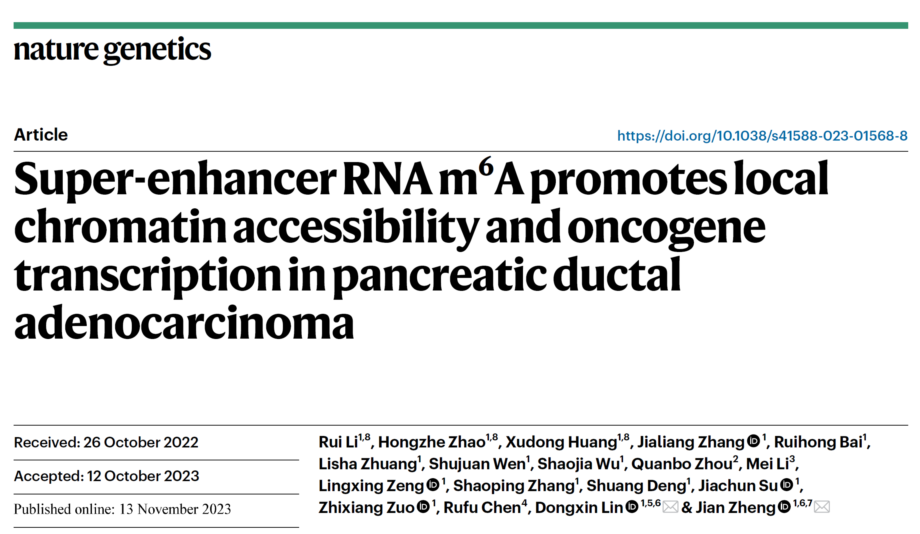Recent studies have shown that m6A modification, which occurs in both coding and noncoding transcripts, plays an important role in regulating DNA or histone methylation and results in chromatin accessibility and certain gene expression. Prof. Lin Dongxin and Prof. Zheng Jian research group has previously demonstrated that m6A modification can enhance certain microRNA maturation that may be involved in the progression of PDAC. It has also been reported that m6A modification in chromosome-associated regulatory RNA (carRNA) may regulate chromatin state and transcription. These studies imply that RNA m6A modification might have various roles in the epigenetic regulation of gene expression, perhaps dependent on the different types of methylated RNAs. Transcription regulation is a complicated program regulated by the orchestrated action of cis elements and trans factors. Enhancers, the cis elements located a long distance away from their target promoters, play important roles in gene expression. Super-enhancers are large clusters of enhancers featured by the extensive intensity or strength of epigenetic markers, such as H3K27ac, H3K4me1 and H3K4me3. The activated super-enhancers recruit transcription factors and RNA polymerase II (RNAPII) to generate seRNAs. The seRNAs might affect transcription processes including assembling the preinitiation complex, initiating transcription, overcoming RNAPII pausing and promoting transcription elongation. It has been reported that seRNA m6A may affect the chromatin state and the downstream gene transcription in mouse embryonic stem cells. However, it remains unclear and thus warrants investigations of whether the seRNA m6A plays a role in human cancer.
On November 13, 2023, a new research article entitled Super-enhancer RNA m6A promotes local chromatin accessibility and oncogene transcription in pancreatic ductal adenocarcinoma from Prof. Lin Dongxin and Prof. Zheng Jian research group was published online in Nature Genetics (Figure 1). In this study, the researchers found that CFL1, a cofilin family protein overexpressed in PDAC, as a METTL3 cofactor that helps seRNA m6A methylation formation. The increased seRNA m6As are recognized by the reader YTHDC2, which recruits H3K4 methyltransferase MLL1 to promote H3K4me3 modification cotranscriptionally. Super-enhancers with a high level of H3K4me3 augment chromatin accessibility and facilitate oncogene transcription in pancreatic cancer. This study revealed for the first time that seRNA m6A regulates histone modification and oncogene transcription, which strengthens the knowledge about the functions of super-enhancers and their transcripts.

Figure 1: The research article published in Nature Genetics
In this study, the researchers obtain chromatin immunoprecipitation (ChIP) sequencing data of H3K27 acetylation (H3K27ac) of PDAC and normal pancreatic tissues or cell lines from the ENCODE and GEO databases to annotate active super-enhancers. By integrating these data with RNA sequencing data from 65 PDAC and 33 adjacent normal tissue samples, they decipher the seRNA m6A methylation profiles in PDAC and find increased seRNA m6A levels in tumour tissues compared to normal tissues. Then they identify CFL1 acts as a cofactor of the RNA methyltransferase METTL3, thereby facilitating m6A modification of seRNAs in PDAC. The increased m6A levels in seRNAs are recognized by the m6A reader YTHDC2, which recruits MLL1, a member of the SET1 family H3K4 methyltransferases, resulting in increased H3K4 trimethylation (H3K4me3) levels. The increased H3K4me3 levels are restricted to the local chromatin region of the activated super-enhancers where seRNA production and m6A modification occurs. High levels of H3K4me3 modification enhance chromatin accessibility and facilitate the transcription of oncogenes, thus promoting the malignant phenotypes of PDAC. These findings indicate a pivotal role for the m6A-seRNA-associated CFL1–YTHDC2–MLL1 axis in the modulation of chromatin accessibility and the regulation of gene transcription pertinent to cancer progression in PDAC (Figure 2).

Figure 2: seRNA m6A deposited by the writer METTL3–CFL1 complex is recognized by the m6A reader YTHDC2, which recruits MLL1 to catalyze H3K4me3 methylation
Li Rui, Zhao Hongzhe and Huang Xudong are the co-first authors of this paper. Prof. Zheng Jian and Prof. Lin Dongxin are the co-corresponding authors of the research paper.
The Laboratory of Academician Lin Dongxin of Sun Yat-sen University Cancer Center established in 2015, they focus on genomics and epigenetics in cancer. The team recruits post doctors and researchers, qualified candidates with background in oncology, biochemistry, molecular biology and bioinformatics are warmly welcomed. (Contact: zhengjian@sysucc.org.cn).
Copyright:Sun Yat-sen University Cancer Center Designed by Wanhu.